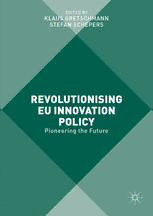
Revolutionising EU Innovation Policy: Pioneering the Future PDF
Preview Revolutionising EU Innovation Policy: Pioneering the Future
EDITED BY KLAUS GRETSCHMANN STEFAN SCHEPERS REVOLUTIONISING EU INNOVATION POLICY Pioneering the Future Revolutionising EU Innovation Policy Klaus G retschmann • Stefan Schepers Editors Revolutionising EU Innovation Policy Pioneering the Future Editors Klaus Gretschmann Stefan Schepers President of CATE Henley Business School Stephanskirchen , Germany Brussels , Belgium ISBN 978-1-137-55553-3 ISBN 978-1-137-55554-0 (eBook) DOI 10.1057/978-1-137-55554-0 Library of Congress Control Number: 2016941741 © Th e Editor(s) (if applicable) and Th e Author(s) 2016 Th e author(s) has/have asserted their right(s) to be identifi ed as the author(s) of this work in accordance with the Copyright, Designs and Patents Act 1988. Th is work is subject to copyright. All rights are solely and exclusively licensed by the Publisher, whether the whole or part of the material is concerned, specifi cally the rights of translation, reprinting, reuse of illustrations, recitation, broadcasting, reproduction on microfi lms or in any other physical way, and t ransmission or information storage and retrieval, electronic adaptation, computer software, or by similar or dissimilar methodology now known or hereafter developed. Th e use of general descriptive names, registered names, trademarks, service marks, etc. in this publication does not imply, even in the absence of a specifi c statement, that such names are exempt from the relevant protective laws and regulations and therefore free for general use. Th e publisher, the authors and the editors are safe to assume that the advice and information in this book are believed to be true and accurate at the date of publication. Neither the publisher nor the authors or the editors give a warranty, express or implied, with respect to the material contained herein or for any errors or omissions that may have been made. Printed on acid-free paper Th is Palgrave Macmillan imprint is published by Springer Nature Th e registered company is Macmillan Publishers Ltd. London For Elke, coniugi carissimae, without whose love, aff ection, and backing I would not be who I am Klaus For my mother, Germaine Lijnen, who taught me the values of Europe Stefan Prefa ce W hen in December 2011 the Polish government, while holding the r otating presidency of the Council of the EU, launched the initiative to set up a high-level expert group to look into EU innovation policy, its successes and failures and its needs for reform, then-Prime Minister Tusk and the Minister of Economy Pawlak had perhaps not imagined how important a contribution they were going to make to promoting more eff ective innovation and enhanced innovation policy in the European Union (EU). Th ey had the good sense and courage to mandate us “to think outside the box,” and we were fortunate that the equally visionary Irish and Italian Council presidencies asked us to continue the work. Th e High Level Group on Innovation Policy Management (HLG on IPM) had three characteristics which were meant to substantially improve the creativity and serendipity of our discussions: (1) It had a tripartite com- position, bringing together senior offi cials from the EU Commission and member states representing diff ering models of innovation, senior (inno- vation) managers from corporations of diff erent sectors of the economy, and academic experts from diff erent disciplinary backgrounds; (2) It was independent from the EU Commission and national governments and free from any instructions, and it operated under Chatham House rules to guarantee openness of discussions; (3) It was supposed to be rigorous in its analysis and bold in its conclusions and recommendations. Th is approach was in itself innovative in the EU context of advisory groups and think vii viii Preface tanks. Its work was supported by a most dedicated research team, while the Polish presidency had entrusted EPPA, the management consultancy specialized in business-government interactions, with the overall organiza- tion. Former European Council President Herman Count Van Rompuy has lauded the independence and the quality of the work performed by this public–private arrangement. Th e two reports of the HLG on IPM were submitted to the EU institutions in June 2013 and July 2014, in time for the then new 2014 Commission to be inspired when they envisaged necessary reforms. Although proud institu- tions hardly ever admit that they are being stimulated by outside advice and analysis, but rather claim to develop their own ideas and proposals, often they are silently grateful for being confronted with unorthodox, thought- provoking suggestions and recommendations. I n the course of our proceedings and discussions the idea was brought up that the HLG’s refl ections and ponderings, our arguments, back- ground papers and proposals should not go unheard and gather dust on shelves or rest in peace in a bureaucrat’s drawer but should rather be part of the public discourse on innovation and its role in business, politics and the European society at large. Against this backdrop, members of the HLG enthusiastically embarked when we were encouraged to publish a volume on R evolutionizing EU Innovation Policy . Th ey were eager to thor- oughly scrutinize our arguments and to draft many topics from scratch. Th e result is a selection of chapters by various contributors – interlinked like a monograph – containing many unorthodox and more or less radi- cal ideas and suggestions on how to overhaul EU innovation policy, ideas which may be more profound and far-reaching than politically feasible in the near future. Stephanskirchen, Germany Klaus Gretschmann Brussels, Belgium Stefan Schepers Acknowledgements Chapter 7 – Stefan Schepers: Th e author expresses his gratitude to Tristan du Puy and Léonard Tapié for their contributions. Chapter 9 – Christoph Bausch: Th e author would like to thank Eduardo Mulas for his research that contributed to this article. Chapter 10 – Jean-Claude Th oenig: Catherine Paradeise, Philippe Laredo and Ronan Stéphan have expressed comments and made suggestions that have been very stimulating. My spe- cial gratitude also goes to Stefan Schepers. ix
